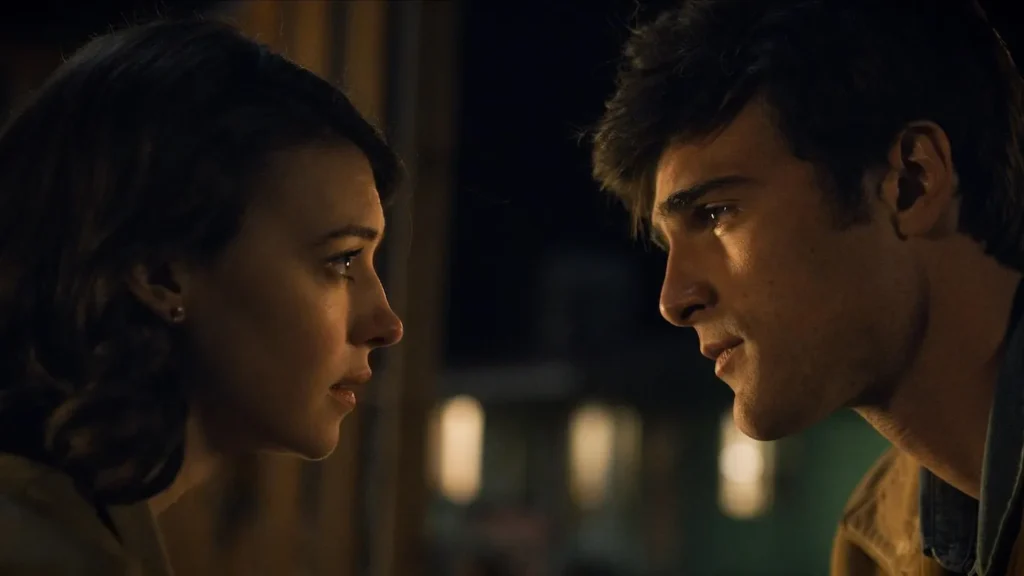‘On Swift Horses’ review: top-notch performances and stellar cinematography buoy a compelling, uneven queer narrative
Written by Ian Thomas Malone, Posted in Blog, Movie Reviews, Pop Culture
Gambling has plenty of natural appeal to closeted members of the LGBTQ community. If you can’t be happy, if you have to live your life within society’s artificially constructed walls, if you have nothing to lose at all, why not bet it all? It’s hard to care very much about planning a future when there’s nothing in it worth looking forward to.
The film On Swift Horses centers its narrative on a few individuals with seemingly nothing to lose. Muriel (Daisy Edgar-Jones) resists the proposals of her boyfriend Lee (Will Poulter), seeing a kindred spirit in his brother Julius (Jacob Elordi), who’s just returned from the Korean War. The three make plans to leave their home in Kansas to build a new life in San Diego, taking advantage of the industrial boom of the 1950s.
While Muriel and Lee head west, Julius spurs their invitations, taking up residence in Las Vegas, where he works security at a casino. Julius quickly falls for Henry (Diego Calva), who shares his affection for cheating at cards, along with passionate nights in their motel room. Muriel, bored at her waitressing job and desperate for some spice in her life, takes up gambling on horse races using information she eavesdrops from her customers to develop an edge. A chance encounter at a race gives Muriel a taste of the river of Sapphos, leading her to an infatuation with their neighbor Sandra (Sasha Calle), who hosts a “book club” for fellow lesbians.
Based on the 2019 novel of the same name by Shannon Pufahl, On Swift Horses is a narrative that’s less concerned with telling a story than showcasing all the steamy parts along the way. Director Daniel Minahan crafts an intimate 1950s landscape for cinematographer Luc Montpellier to play around in. The film goes to certain extremes with its “show don’t tell” approach, throwing most character development out the window in favor of steamy romantic sequences between the pairings of Elordi and Calva, and Edgar-Jones and Calle.
The film largely splits its focus between Muriel and Julius, the former being far more compelling than the latter. Edgar-Jones brings a lot of nuance to Muriel, whose characterization is mostly defined through the audience’s understanding of the lack of agency that women had in the era. Subterfuge is her only way of exerting power, an already complicated dynamic on top of her closeted homosexuality.
There are certain frustrations that the audience might have toward Muriel’s lack of outlet to vocalize some of her angst, but that’s also kind of the point of Minahan’s work. Gay people rarely possessed access to anything that wasn’t in the shadows. Repression warps the mind toward unhealthy outcomes.
The film possesses a lot of maturity to its characters. Poulter is on an island of his own for much of the film, stuck in a loveless marriage while the other four principals have their fun with each other. The narrative resists the urge to vilify Lee, an attractive, simple man with an honest dream, possessing a charming, if not slightly unrealistic level of tolerance toward his brother’s obvious differences. There’s a lot of subtle humor that helps endear the characters that the screenplay mostly keeps at arm’s length.
The 117-minute runtime often struggles with the weight of both Muriel and Julius’ story, an issue compounded by Minihan’s breezy approach to pacing that puts a lot of strain on the third act when the time comes to arrange the many luscious sex scenes into a more compelling tapestry. Muriel’s arc is much more detached from her relationship with Sandra than Julius’ is with Henry. In certain ways, it’s nice to see what Edgar-Jones does with the space afforded to explore Muriel on her own, honing in on the loneliness that often defines the queer quest for love, but Calle is such a delight in every single scene that you can’t help feeling like their relationship got the short end of the stick when it comes to screen time.
Minahan does avoid one potential pitfall for his narrative. Audiences in 2025 do not need to be told that it was hard to be gay in the 1950s. On Swift Horses is a film about closeted people that dedicates little time to the exploration of the closet itself, a welcome departure from many narratives centered on the queer experience, especially from a historical sense. Edgar-Jones masterfully captures the innate struggle of trying to find happiness in a world diametrically opposed to queer joy. Without excusing its narrative shortcomings, the film does manage to synchronize its flaws to the broader reality that this era hardly possessed happiness that was not itself quite messy.
A lot of queer films fall into the trap of trying to be everything to everyone, reflecting the challenges that LGBTQ narratives have in trying to appeal to audiences both inside the community and those who know little about the broader Rainbow Empire. With that in mind, it’s quite refreshing to see a film like On Swift Horses so content to march to the beat of its own drum. The film very much understands the gamble that all queer people struggle with, to make the hardest gamble of them all, to bet on oneself.
It doesn’t always work. The narrative isn’t focused enough to give all five of its primary characters enough to do. From the actors to the talent behind the scenes, it’s clear that everyone showed up eager to play. It’s not perfect, but there’s a lot of beauty to be found in the way that this sprawling piece of work came together, a worthwhile inclusion to the queer canon.











